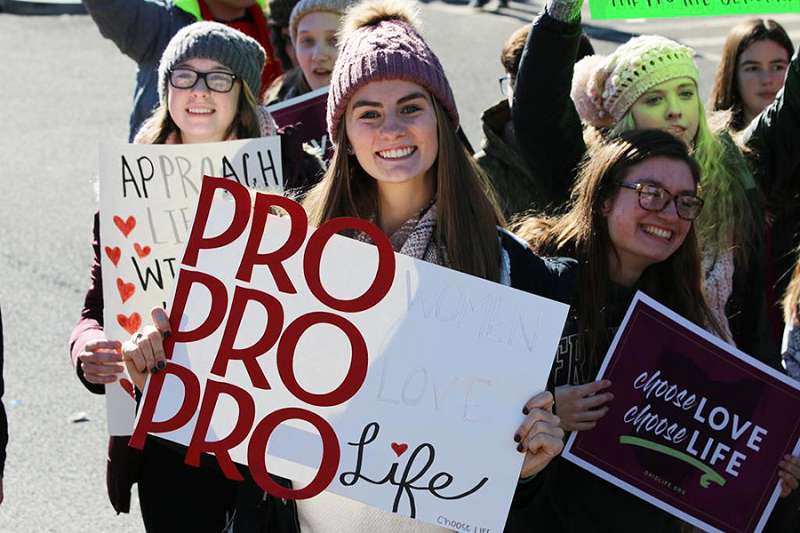The Director of Public Policy for the Archdiocese of New York has said that overturning the Roe vs. Wade Supreme Court decision should not be the seen as the final objective for pro-life advocates in the United States.
In a blog post written before President Donald Trump nominated Judge Brett Kavanaugh to fill a Supreme Court vacancy, Mechmann warned that during the confirmation process for any nominee, “the rhetoric will be heated and likely ugly, and may even include a large dose of religious intolerance.”
Mechmann’s post explained that the advance of secularism and moral relativism have detached judicial decisions from the principles of natural law. Without this foundation, Mechmann argued, judicial interpretation lacks a “moral and legal compass” to guide decisions.
The result is that the judicial process and the Supreme Court are increasingly accepted as politically tainted, something the framers of the Constitution never intended, he said.
If confirmed by the Senate, Judge Kavanaugh is expected to join the more conservative wing of the Supreme Court. He is widely considered to be an “originalist,” interpreting the Constitution according to its plain-text reading and the intentions and understanding of the founding fathers themselves.
This standard is then applied when “originalist” judges evaluate whether legislation conforms to the Constitution.
Originalist thinkers are often seen to oppose so-called “living” readings of the Constitution, in which legal rights and principles are inferred to exist in the light of modern values, even if they are not contained in the text itself.
In the context of abortion, the decision Roe v. Wade rested on the Court’s inference of a “right to privacy” for women seeking abortions, something which is explicitly not found in the Bill of Rights. The subsequent decision Planned Parenthood v. Casey, delivered in 1992, affirmed the right to privacy and the legal protection it affords abortion. That decision was co-authored by Justice Anthony Kennedy, who last month announced his retirement from the Supreme Court, creating the current vacancy. If confirmed, Judge Kavanaugh could create what many have predicted to be a 5-4 majority on the Court in favor of overturning Roe v. Wade.
But Mechmann, a Harvard educated lawyer who previously worked in the United States’ Attorney’s Office for the Eastern District of New York, noted that an originalist majority did not necessarily mean Roe would be overturned.
Roe, said Mechmann, did not just “emerge fully formed from the brow of Justice Blackmun” [author of the decision]. Rather, it was “the result of decades of prior decisions, reaching back to the 1920's.” Consequently, overturning Roe would involve repudiating a deeply embedded body of legal argument, he said. Such a dramatic step would “set off a political explosion that would undermine the legitimacy of the Court in the eyes of a large number of Americans.”
Such a “political explosion” might already have begun, as abortion advocates react to the nomination of Judge Kavanaugh. Terry McAuliffe, the former Governor of Virginia, said July 9 that Kavanaugh’s nomination “will threaten the lives of millions of Americans for decades to come.”
Even if a “pro-life” appointee were confirmed, Roe v. Wade is not certain to be overturned, Mechmann argued. Several of the more conservative Supreme Court Justices often prefer to make decisions on narrowly defined questions relevant to particular cases. Mechmann noted this tendency in past decisions from Chief Justice John G. Roberts, and Justices Alito and Gorsuch, and suggested there could be a succession of such rulings which chip away at legal protections for abortion, but stop short of a single dramatic reversal.
The strength of expectation around a possible reversal of Roe v. Wade has led many to assume it would result in abortion becoming illegal overnight, yet this is not the case, Mechmann said. In the event that the Supreme Court reversed itself and removed the inferred constitutional protection for abortion, the issue would again be subject to state-by-state legislation. This, Mechmann pointed out, would yield very mixed results.
“A number of states already have laws on the books that would essentially permit abortion on demand for some, if not all of pregnancy. New York's statute, for example, permits abortion on demand prior to 24 weeks of pregnancy. According to one expert on abortion law, if Roe and Casey were overruled, only eleven states would have laws that would completely outlaw abortion, and over 80% of Americans would live in states where the situation would be essentially unchanged -- abortion would still be legal for all nine months of pregnancy for virtually any reason and with little effective regulation.”
As many as twelve states already recognize a Constitutional right to abortion.
A Supreme Court majority willing to overturn Roe v. Wade is not, Mechmann warns, “a magic bullet that will make all things new.” While it would be a significant victory for pro-life advocates, their work would need to continue at the state level. This would involve political and legislative efforts to protect the unborn state-by-state, and, just as important, include cultural efforts.
“We have to work harder to create a social infrastructure that would replace the culture of contraception and abortion and promote a vision of women's health that truly respects her fertility and genuine freedom. We still have a lot of work to do.”

